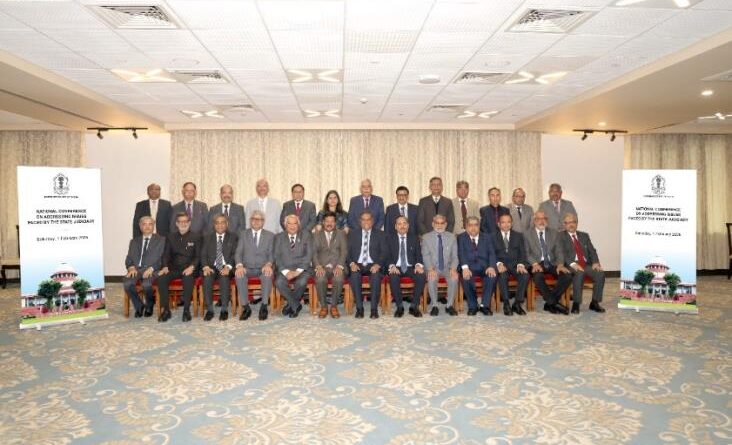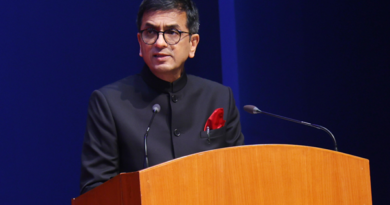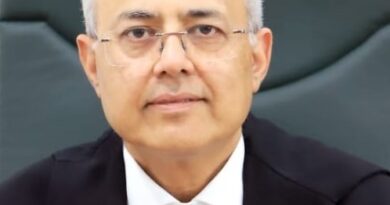Supreme Court of India Hosts Groundbreaking National Conference to Address Challenges of the State Judiciary
(Judicial Quest News Network)
Delhi, February, 03,2025.On February 1, 2025, the Supreme Court of India hosted a significant National Conference at the Multi-purpose Hall of the Administrative Buildings Complex. The conference, titled “Addressing Issues Faced by the State Judiciary,” was aimed at facilitating a constructive dialogue among key stakeholders and functionaries within the State Judiciary, with a special focus on District Courts. The goal of the conference was twofold: to understand the challenges that hinder the smooth functioning of the judiciary at the state level and to collaboratively devise practical strategies to resolve these issues.
The conference featured four insightful Technical Sessions, each designed to address distinct yet interrelated aspects of the judicial process.
Session 1: Optimizing Case Management and Reducing Backlog
The first Technical Session, chaired by Hon’ble Justice Sanjiv Khanna and co-chaired by Hon’ble Justices Abhay S. Oka, B.V. Nagarathna, and Dipankar Datta, delved into critical issues concerning the timely disposal of cases. Key discussions included identifying the types of cases that overwhelm judicial dockets, pinpointing the bottlenecks that delay case disposal, and strategizing on effective measures to reduce the backlog of cases at all levels of the judiciary. The session explored ways to bridge the gap between institutional capabilities and the growing caseload.
Session 2: Technology and Case Categorization
In the second Technical Session, chaired by Hon’ble Justice B.R. Gavai, with co-chairs Hon’ble Justices P.S. Narasimha and K.V. Viswanathan, participants explored the feasibility of implementing a uniform case categorization system across courts. Additionally, the session focused on how technology could be leveraged more effectively to streamline judicial processes and enhance the efficiency of case management. The integration of innovative technological solutions was identified as key to optimizing judicial operations.
Session 3: Recruitment, Transfer, and Data Management
The third session, chaired by Hon’ble Justice Surya Kant and co-chaired by Hon’ble Justices J.K. Maheshwari and Sudhanshu Dhulia, addressed the pressing need for timely recruitment of judicial officers and court staff. The discussion also covered the continual recruitment and empanelment of public prosecutors, legal aid counsels, and defense counsels. A proposal was made for the creation of a permanent IT and Data Cadre within all High Courts and District Courts. Additionally, participants discussed the need for an objective and transparent policy regarding the transfer of judicial officers and the importance of ensuring fairness in the process of recommending candidates for elevation to the High Courts.
Session 4: Judicial Officer Career Development and Accountability
The final session, chaired by Hon’ble Justice Sanjiv Khanna and co-chaired by Hon’ble Justices Vikram Nath, M.M. Sundresh, and Bela Trivedi, explored career progression and the continuous performance evaluation of judicial officers. Discussions focused on the mentoring of judicial officers through inspecting judges and state judicial academies. The session also emphasized the need for a standardized curriculum for the training and capacity building of judicial officers. Additionally, strategies for ensuring greater accountability within the judiciary were thoroughly examined.
Key Attendees and Participation
The conference was graced by distinguished guests, including Hon’ble Justices of the Supreme Court and Chief Justices and Judges of various High Courts. District Judges from across all States and Union Territories participated in the event, along with senior bureaucrats from the Ministry of Home Affairs and the Ministry of Law and Justice.
This conference provided a unique platform for all stakeholders in the judiciary to come together, discuss critical issues, and collaborate on actionable solutions for addressing the challenges facing the State Judiciary. It marked a pivotal moment in the ongoing efforts to enhance the efficiency, transparency, and accessibility of the judicial system in India.




